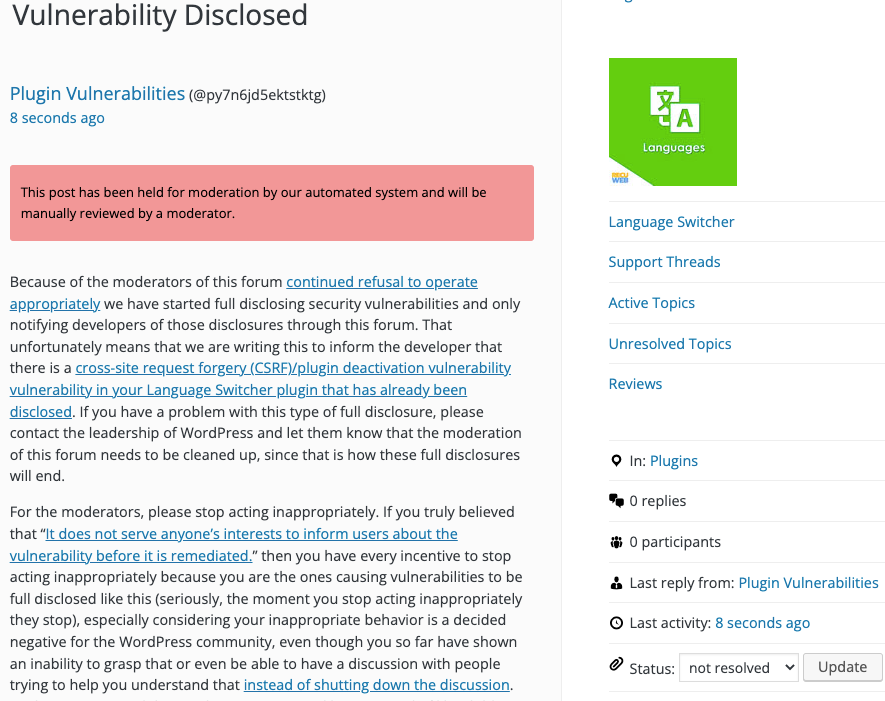Our Proactive Monitoring Caught a CSRF/Plugin Deactivation Vulnerability in Language Switcher
One way we help to improve the security of WordPress plugins, not just for our customers of our service, but for everyone using them, is our proactive monitoring of changes made to plugins in the Plugin Directory to try to catch serious vulnerabilities. Through that, we caught a variant of those vulnerabilities, a cross-site request forgery (CSRF)/plugin deactivation vulnerability in the plugin Language Switcher.
We now are also running all the plugins used by customers through that on a weekly basis to provide additional protection for our customers.
The possibility of this vulnerability is also flagged by our Plugin Security Checker, so you can check plugins you use to see if they might have similar issues with that tool.
CSRF/Plugin Deactivation
The automated portion of the monitoring flagged the following line of code in the file /includes/lib/class-language-switcher-admin-api.php, which passes the value of user input to the function that deactivates a plugin:
216 | deactivate_plugins($_GET['plugin']); |
Checking further on this, we found that line of code would run when accessing the Addons tab of the plugin’s Settings page in the admin area of WordPress, /wp-admin/admin.php?page=language-switcher&tab=addons, with the addon Languages Everywhere installed.
That page is only accessible by Administrators:
85 | add_submenu_page( 'lsw_plugin_panel', 'Settings', 'Settings', 'manage_options', 'language-switcher', array( $this, 'settings_page' ) ); |
It would not be a vulnerability for them to be able to deactivate a plugin, but as the proof of concept below confirms, this could be exploited through cross-site request forgery (CSRF).
WordPress Causes Full Disclosure
As a protest of the moderators of the WordPress Support Forum’s continued inappropriate behavior we changed from reasonably disclosing to full disclosing vulnerabilities for plugins in the WordPress Plugin Directory in protest, until WordPress gets that situation cleaned up, so we are releasing this post and then leaving a message about that for the developer through the WordPress Support Forum. (For plugins that are also in the ClassicPress Plugin Directory, we will follow our reasonable disclosure policy.)
You can notify the developer of this issue on the forum as well.
Hopefully, the moderators will finally see the light and clean up their act soon, so these full disclosures will no longer be needed (we hope they end soon). You would think they would have already done that, but considering that they believe that having plugins, which have millions installs, remain in the Plugin Directory despite them knowing they are vulnerable is “appropriate action”, something is very amiss with them (which is even more reason the moderation needs to be cleaned up).
If the moderation is cleaned up, it would also allow the possibility of being able to use the forum to start discussing fixing the problems caused by the very problematic handling of security by the team running the Plugin Directory, discussions which they have for years shut down through their control of the Support Forum.
Update: To clear up the confusion where developers claim we hadn’t tried to notify them through the Support Forum (while at the same time moderators are complaining about us doing just that), here is the message we left for this vulnerability:

Is It Fixed?
If you are reading this post down the road the best way to find out if this vulnerability or other WordPress plugin vulnerabilities in plugins you use have been fixed is to sign up for our service, since what we uniquely do when it comes to that type of data is to test to see if vulnerabilities have really been fixed. Relying on the developer’s information can lead you astray, as we often find that they believe they have fixed vulnerabilities, but have failed to do that.
Proof of Concept
The following proof of concept will cause the plugin Akismet to be deactivated, when logged in as an Administrator, the addon Languages Everywhere is installed, and Akismet being active.
Replace “[path to WordPress]” with the location of WordPress.
http://[path to WordPress]/wp-admin/admin.php?page=language-switcher&tab=addons&action=deactivate&plugin=akismet%2Fakismet.php